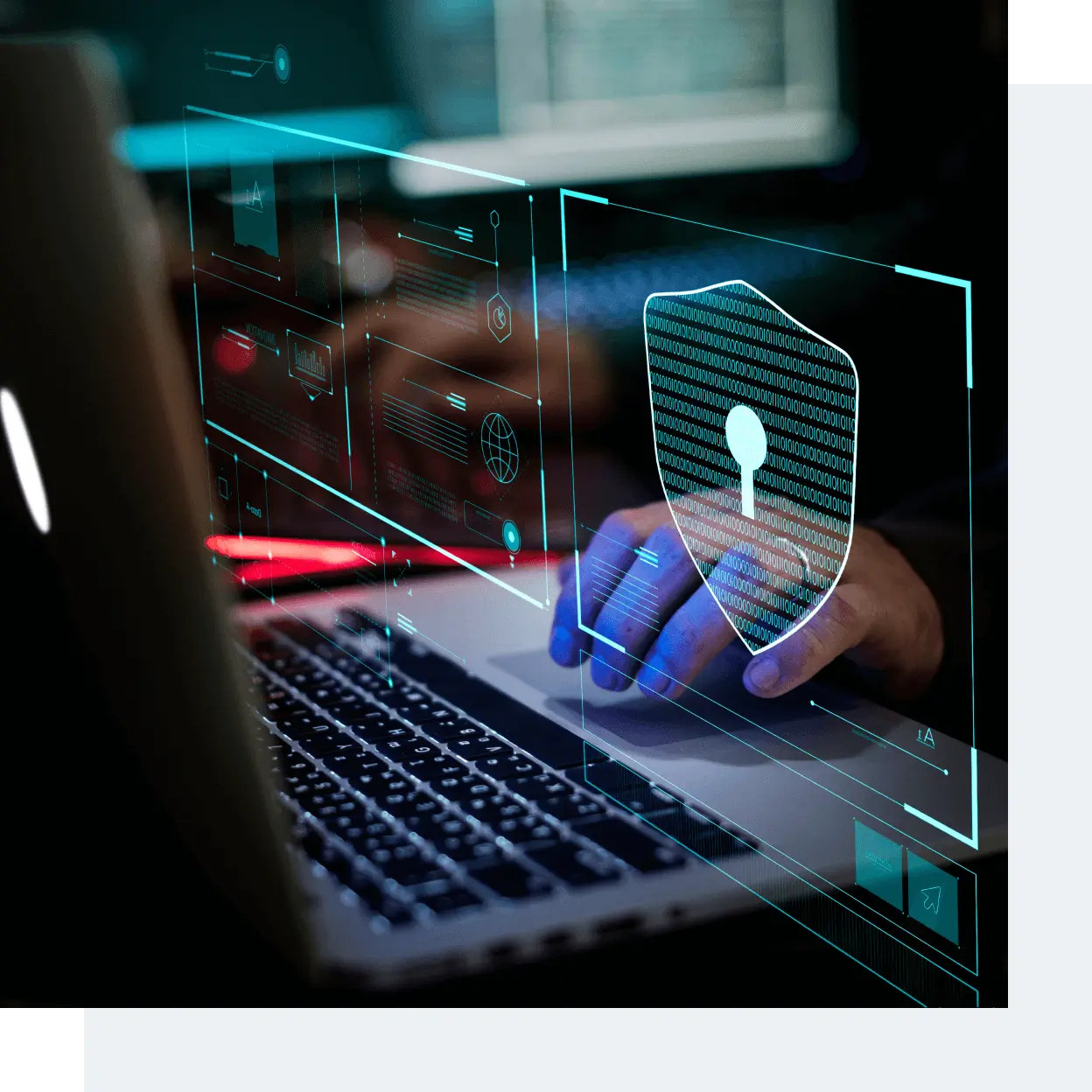By Nirmal John
Essential Cybersecurity Measures: How to Choose the Right Security Services in 2025
Friday March 28, 2025

Essential Cybersecurity Measures: How to Choose the Right Security Services in 2025
In today’s digital landscape, cybersecurity isn’t just an IT concern—it’s a business imperative. With cyberattacks becoming more sophisticated and frequent, organizations of all sizes face significant threats to their data, operations, and reputation. According to recent statistics, the average cost of a data breach reached $4.45 million in 2024, with recovery times extending to months rather than days. The good news? A robust security strategy with the right protective measures can significantly reduce these risks. This guide will help you navigate the complex world of cybersecurity services to find the perfect fit for your business needs.
Understanding Modern Cybersecurity Threats
Before investing in security services, it’s essential to understand what you’re up against. The threat landscape continues to evolve, with several key concerns dominating the cybersecurity conversation in 2025.
Ransomware Attacks
Ransomware remains one of the most destructive forms of malware, encrypting valuable data and demanding payment for its release. These attacks have grown increasingly targeted, with cybercriminals focusing on organizations they believe will pay higher ransoms.
Key Concerns:
- Business Disruption: Operations can grind to a halt when critical systems become inaccessible.
- Data Loss: Even after paying ransoms, full data recovery isn’t guaranteed.
- Reputational Damage: Customer trust plummets after publicized ransomware incidents.
- Financial Impact: Beyond ransoms, costs include downtime, recovery efforts, and potential regulatory fines.
Recent attacks have shown that no industry is immune, with healthcare, education, and manufacturing sectors being particularly vulnerable due to their often limited security resources combined with valuable data assets.
Advanced Persistent Threats (APTs)
Unlike opportunistic attacks, APTs involve methodical, long-term campaigns targeting specific organizations, often for espionage or intellectual property theft.
Why They’re Dangerous:
- Stealth Operation: These threats can remain undetected for months or even years.
- Sophisticated Techniques: APTs often employ zero-day vulnerabilities and advanced evasion methods.
- Persistent Access: Once established, they maintain a foothold in your network, continuously extracting data or causing damage.
Organizations with valuable intellectual property, government contracts, or sensitive customer data are prime targets for APT actors, many of whom have state-level resources and expertise.
Supply Chain Vulnerabilities
Supply chain attacks compromise trusted software or hardware vendors to distribute malware to their customers. The SolarWinds incident demonstrated how devastating these attacks can be, affecting thousands of organizations through a single compromised update.
Major Concerns:
- Widespread Impact: A single breach can affect countless downstream customers.
- Difficult Detection: Malicious code distributed through trusted channels often bypasses traditional security measures.
- Complex Remediation: Organizations must identify and address all compromised systems across their environment.
As businesses increase their reliance on third-party software and services, supply chain vulnerabilities have become a critical security concern requiring specialized monitoring and vetting processes.

Essential Cybersecurity Services for Modern Businesses
Protecting your organization requires a multi-layered approach with several key components working together. Let’s explore the fundamental security services every business should consider.
Anti-Virus and Ransomware Protection
Antivirus software remains a cornerstone of cybersecurity, though modern solutions have evolved far beyond simple signature-based detection.
What to Look For:
- Behavioral Analysis: Advanced solutions detect threats by identifying suspicious behaviors rather than relying solely on known malware signatures.
- Machine Learning Capabilities: AI-driven systems continuously improve threat detection without waiting for manual updates.
- Ransomware-Specific Features: Look for capabilities like automatic backup of critical files and ransomware rollback functionality.
- Low System Impact: Effective protection shouldn’t come at the cost of system performance.
GigeNET’s partnership with ESET provides comprehensive protection against both conventional viruses and sophisticated ransomware attacks. Their solution combines traditional detection methods with advanced heuristic analysis to identify and neutralize threats before they can cause damage. By implementing this preventative approach, businesses can avoid the potentially devastating consequences of successful attacks.
Intrusion Prevention Systems (IPS)
While firewalls control traffic based on predefined rules, intrusion prevention systems actively analyze network traffic to identify and block suspicious activities.
Key Benefits:
- Real-Time Monitoring: Continuous traffic analysis identifies threats as they emerge.
- Proactive Protection: IPS can prevent exploitation of known vulnerabilities, even before patches are applied.
- Comprehensive Visibility: Detailed logs provide valuable insights for security teams.
- Regulatory Compliance: Many compliance frameworks specifically require IPS deployment.
GigeNET’s intrusion prevention service continuously monitors network traffic for suspicious patterns, blocking potential attacks before they reach vulnerable systems. This proactive approach is particularly valuable for businesses with critical online operations where even brief security incidents could have significant impacts. With both known vulnerability protection and anomaly detection capabilities, their solution provides comprehensive coverage against a wide range of attack vectors.
Vulnerability Scanning and Management
You can’t protect what you don’t know is vulnerable. Regular vulnerability scanning identifies security weaknesses before attackers can exploit them.
Why It’s Essential:
- Risk Prioritization: Not all vulnerabilities pose equal risk; scanning helps identify what needs immediate attention.
- Compliance Requirements: Many regulatory frameworks mandate regular vulnerability assessments.
- Reduced Attack Surface: Systematic identification and remediation of vulnerabilities significantly reduces your attack surface.
- Measurable Security Posture: Tracking vulnerability metrics over time demonstrates security program effectiveness.
GigeNET’s vulnerability scanning service helps businesses identify potential security gaps across their infrastructure before malicious actors can exploit them. Their comprehensive approach covers both internal and external-facing systems, providing detailed reports that prioritize findings based on risk level and exploitability. This allows technical teams to address the most critical vulnerabilities first, maximizing the impact of their security efforts.
Firewall Protection (Hardware and Software)
Firewalls remain fundamental to network security, serving as the first line of defense against unauthorized access and malicious traffic.
Types of Firewalls:
- Network Firewalls: Hardware devices that protect entire networks by filtering traffic based on predefined rules.
- Host-Based Firewalls: Software running on individual systems to control incoming and outgoing connections.
- Next-Generation Firewalls (NGFWs): Advanced solutions that combine traditional firewall capabilities with additional features like intrusion prevention, application awareness, and deep packet inspection.
- Web Application Firewalls (WAFs): Specialized firewalls designed to protect web applications from specific attacks like SQL injection and cross-site scripting.
GigeNET offers both hardware and software firewall solutions, allowing businesses to implement the right protection for their specific needs. Their team provides expert guidance on firewall selection and configuration, ensuring optimal protection without unnecessarily restricting legitimate traffic. With options ranging from basic protection for small businesses to enterprise-grade NGFWs for organizations with complex security requirements, GigeNET helps companies implement appropriate defensive barriers regardless of their size or technical sophistication.

Key Factors to Consider When Selecting Cybersecurity Services
Choosing the right security services involves more than just comparing features and prices. Consider these critical factors to ensure your selected solutions truly meet your organization’s needs.
Comprehensive Protection vs. Point Solutions
When evaluating cybersecurity services, you’ll need to decide between integrated security platforms and specialized point solutions.
Integrated Platforms:
- Pros: Simplified management, consistent policy enforcement, and often better integration between security components.
- Cons: Potential vendor lock-in and possibly weaker capabilities in specific areas compared to best-of-breed alternatives.
Point Solutions:
- Pros: Often provide superior capabilities in their specific focus areas and greater flexibility in vendor selection.
- Cons: More complex management, potential integration challenges, and possible security gaps between solutions.
The right approach depends on your organization’s size, security team capabilities, and specific requirements. Many businesses find that a hybrid approach—using an integrated platform for core functions while supplementing with specialized solutions for critical areas—provides the best balance of protection and manageability.
GigeNET’s approach focuses on providing comprehensive protection while maintaining flexibility. Their security experts can help you determine whether an integrated solution or a combination of specialized services best fits your specific needs and technical environment.
Scalability and Business Growth
As your business grows, your security needs will evolve. The solutions you implement today should be able to grow with you to avoid costly replacements or significant reconfigurations.
Consider:
- User Expansion: Can the service easily accommodate additional users without performance degradation or prohibitive cost increases?
- Infrastructure Changes: How well does the solution adapt to new technologies, cloud migrations, or acquisitions?
- Feature Scalability: Can you start with basic features and add more advanced capabilities as your security program matures?
GigeNET’s security services are designed with scalability in mind, allowing businesses to start with essential protections and expand as their needs grow. Their subscription-based model enables easy scaling without significant upfront investments, making enterprise-grade security accessible to businesses at various stages of growth.
Managed vs. Self-Service Options
Your internal security resources and expertise will largely determine whether managed or self-service security solutions are most appropriate.
Managed Security Services:
- Pros: Access to security expertise, 24/7 monitoring, reduced burden on internal IT staff, and often faster incident response.
- Cons: Higher ongoing costs and potentially less control over security operations.
Self-Managed Solutions:
- Pros: Greater control, potentially lower long-term costs, and better integration with internal processes.
- Cons: Requires adequate internal expertise, may struggle with 24/7 coverage, and faces challenges keeping pace with evolving threats.
GigeNET offers flexible engagement models ranging from fully managed security services to supported self-service options. This allows businesses to select the appropriate level of external support based on their internal capabilities and security requirements. Their expert team can provide guidance, implementation assistance, and ongoing management tailored to each client’s specific needs.
Regulatory Compliance Requirements
Different industries face varying compliance requirements, from HIPAA in healthcare to PCI DSS for payment processing. Your security services must help you meet these obligations.
Key Considerations:
- Industry-Specific Controls: Does the service implement the specific controls required by relevant regulations?
- Compliance Reporting: Can the solution generate reports that demonstrate compliance to auditors?
- Audit Support: Will the provider assist during compliance audits?
- Compliance Updates: How does the service adapt when regulatory requirements change?
GigeNET’s security services are designed with compliance requirements in mind, helping businesses meet their regulatory obligations across various frameworks. Their team stays current with evolving compliance standards to ensure their solutions continue to satisfy regulatory requirements, reducing the compliance burden on their clients.
The Human Element in Cybersecurity
While technical solutions provide essential protection, the human element remains critical in any security program. Even the most advanced security services can’t compensate for uninformed users or poor security practices.
Security Awareness Training
Employee education significantly reduces security incidents, as many successful attacks rely on human error rather than technical vulnerabilities.
Effective Training Programs:
- Regular Updates: Cybersecurity threats evolve constantly; training should keep pace.
- Relevant Scenarios: Focus on the specific threats your organization faces rather than generic security concepts.
- Measurable Results: Use simulated phishing and other assessments to measure effectiveness and identify areas for improvement.
- Positive Reinforcement: Create a culture where security awareness is valued and rewarded.
While primarily focused on technical solutions, GigeNET recognizes the importance of user awareness in maintaining strong security postures. Their team can provide guidance on implementing effective security awareness programs that complement their technical protections, creating a more comprehensive security strategy.
Incident Response Planning
Despite best efforts, security incidents can still occur. Having a well-defined incident response plan minimizes damage and accelerates recovery.
Key Components:
- Clear Roles and Responsibilities: Everyone should understand their responsibilities during an incident.
- Communication Protocols: Establish how information will be shared internally and externally.
- Containment Strategies: Define procedures to limit damage when breaches occur.
- Recovery Processes: Document steps to restore normal operations after an incident.
- Post-Incident Analysis: Learn from each incident to strengthen future security.
GigeNET’s security experts can help businesses develop effective incident response plans that integrate with their technical security measures. This preparation ensures that when incidents occur, response is swift and effective, minimizing potential damage and recovery time.
Making the Right Choice for Your Business
Selecting the right security services involves understanding your specific risks, evaluating available solutions, and finding a provider that fits your needs. Here’s a practical approach to making this critical decision:
- Assess Your Security Posture: Identify your most valuable assets, current protections, and potential vulnerabilities.
- Prioritize Risks: Focus on the threats that pose the greatest risk to your specific business.
- Evaluate Budget Constraints: Determine what you can realistically invest in security while recognizing the potential costs of inadequate protection.
- Consider Internal Resources: Honestly assess your team’s security expertise and availability.
- Research Potential Providers: Look for security partners with experience in your industry and a track record of reliability.
- Request Demonstrations: See solutions in action before committing.
- Check References: Speak with current customers, particularly those with similar needs.
GigeNET’s consultative approach helps businesses navigate this process, ensuring they implement cybersecurity services that effectively address their specific risks and requirements. Their team works closely with clients to understand their unique security challenges and recommend appropriate protections rather than pushing one-size-fits-all solutions.
Experience the GigeNET Difference
In the complex world of cybersecurity, having the right partner makes all the difference. GigeNET combines comprehensive security services with expert support to help businesses establish and maintain robust protection against evolving threats.
Their security offerings include:
- Advanced anti-virus and ransomware protection through their partnership with ESET
- Proactive intrusion prevention systems that monitor networks for suspicious activity
- Comprehensive vulnerability scanning to identify weaknesses before attackers can exploit them
- Both hardware and software firewall solutions tailored to specific business needs
What truly sets GigeNET apart is their commitment to customer success. Their security experts work closely with clients to understand their unique requirements, implement appropriate protections, and provide ongoing support as needs evolve. This premium service ensures that businesses not only deploy effective security measures but also maintain and adapt them as threats and business requirements change.
Ready to strengthen your security posture? Contact GigeNET or call (800) 561-2656 to discuss your specific security needs and discover how their services can help your business reach its full potential while staying protected against cyber threats.
About the author
Recent articles
Essential Cybersecurity Measures: How to Choose the Right Security Services in 2025
Essential Cybersecurity Measures: How to Choose the Right Security Services in 2025 In today’s digital...
Read MoreQuad Core Dedicated Servers
Interested in Quad Core Dedicated Servers? View our inventory. What is a quad core dedicated...
Read More8 Core Dedicated Servers
For website owners looking to eliminate their hardware bottlenecks, the massive power capabilities of an...
Read More